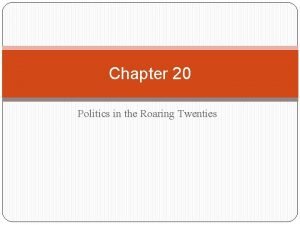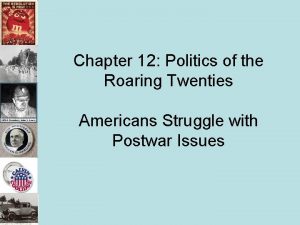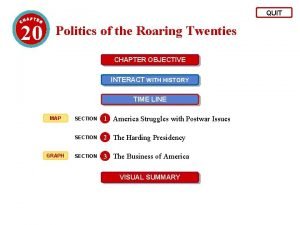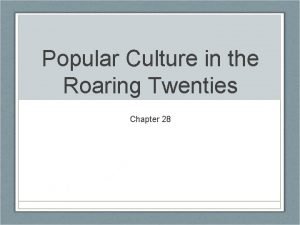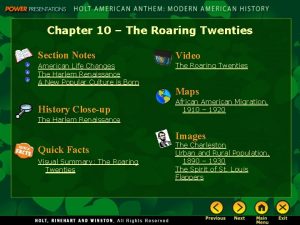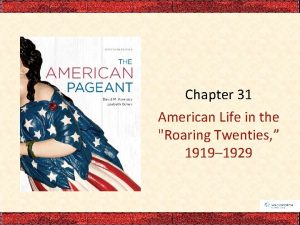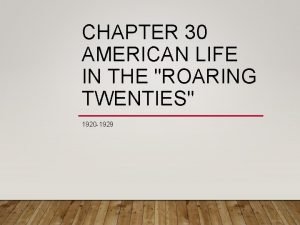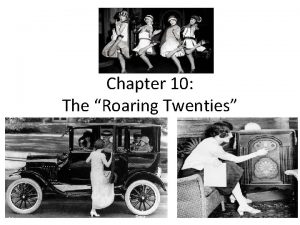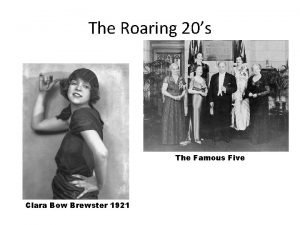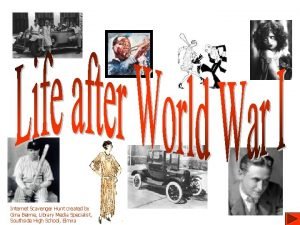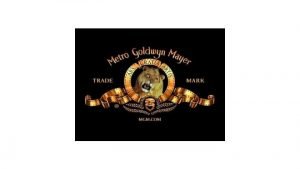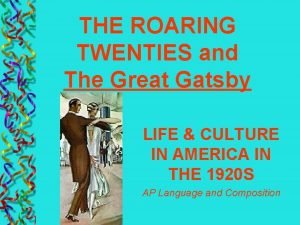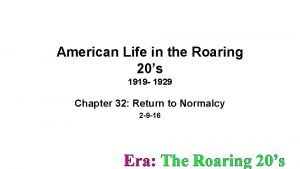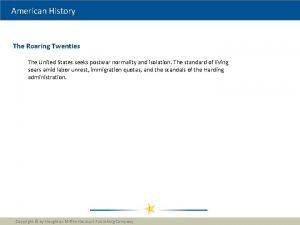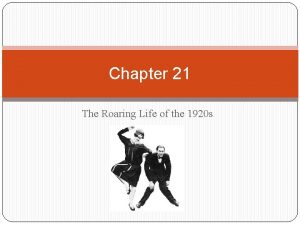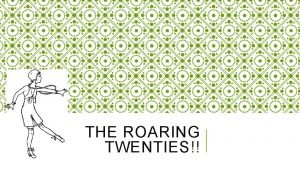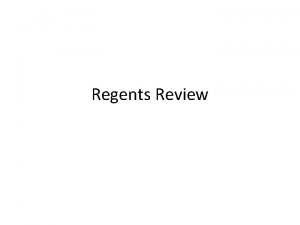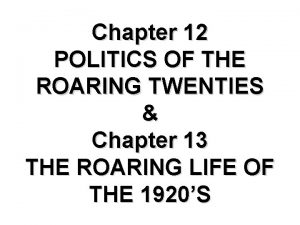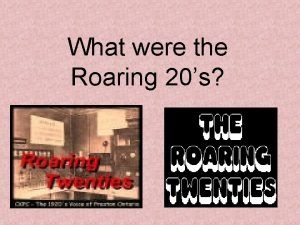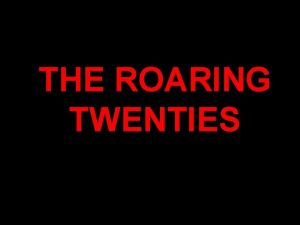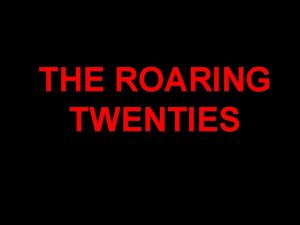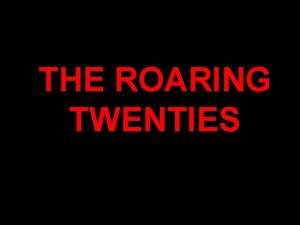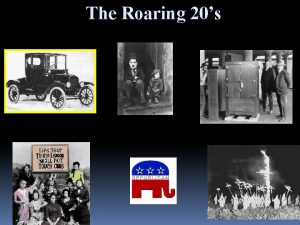Politics of the Roaring Twenties Chapter 20 I
















- Slides: 16

Politics of the Roaring Twenties Chapter 20

I. Revolution abroad and reaction at home A. Three trends in America after WWI 1. Renewed isolationism 2. Resurgence of nativism 3. A rejection of Progressivism and a move towards conservatism B. The Russian Revolution—the Russians turned to Communism

C. The Red Scare 1. The American people feared a worldwide Communist revolution 2. Some Americans joined the US Communist Party 3. The Palmer Raids a. Attorney General A. Mitchell Palmer sent government agents to hunt down suspected Communists b. the agents violated people’s civil rights—invading private homes, jailing suspects for weeks without legal representation, deporting radicals without trials c. Sacco and Vanzetti—two Italian radicals were tried and executed based on very sketchy evidence

4. The KKK—regained power by appealing to those who felt threatened by changes in American life a. anti-Jew b. anti-black c. anti-union d. anti-Catholic e. anti-foreigners

II. A time of Labor Unrest A. 3000 strikes in 1919 1. Wages had not kept up with prices 2. Employers did not want workers to join unions 3. In order to hurt the image of unions, employers tried to show that unions were planning a revolution

B. Three strikes grabbed public attention 1. The Boston Police Strike—the police asked for a wage increase and were promptly fired, which led to a strike of the entire police force a. Governor Calvin Coolidge called in the National Guard and the strike was ended b. He stated, “there is no right to strike against the public safety…”

2. The Steel Mill Strike a. US Steel corporation strike b. the steel companies hired strikebreakers and used force 3. The Coal Miners Strike a. John L. Lewis was a capable union leader b. Unionism was more successful in the coal mines

C. Labor movement suffers because: 1. Many workers were poor immigrants who had few options for work 2. Immigrants spoke many different languages so unions had trouble organizing them 3. Former farmers who moved to cities and took factory jobs were used to relying on themselves—so they were hard to unionize

III. “Normalcy” and Isolationism A. The Republican, Warren Harding wins the 1920 presidential election, he campaigned with the message of a “return to normalcy”

B. Working for Peace 1. Washington Naval Conference— nations agreed to disarm 2. Kellogg-Briand Pact—signed by most every country—it outlawed war C. High Tariffs and Reparations 1. Fordney-Mc. Cumber Tariff—a high tariff designed to protect American business. It made it difficult for Britain and France to repay the US for war debt 2. The US then lent Germany money to pay back Britain and France who then paid back the US---with our own money!

IV. Limiting Immigration A. Nativists wanted fewer immigrants— they pointed out that there were fewer available jobs for them to fill B. Also racist attitudes contributed to the anti-immigrant attitude C. The quota system—limited the number of immigrants from any one country to 2% of the number of its people living in the US D. As a result European immigration to the US was greatly reduced

V. Scandal Hits Harding’s Administration A. Harding had some good advisors such as Hoover, Hughes, and Mellon but he also had some bad ones, known as the Ohio Gang B. His corrupt friends used their offices to become wealthy C. The Teapot Dome Scandal 1. Secretary of the Interior Albert B. Fall got rich after selling public land in Teapot Dome, Wyoming to oil companies 2. Harding escaped becoming caught in the controversy, but then had a heart attack and died in 1923—Calvin Coolidge became president

VI. America’s Standard of Living Soared A. The impact of the automobile 1. Paved roads cover the country 2. Homes came with driveways or garages 3. Gas stations spring up all over 4. workers could live miles from their jobs leading to urban sprawl

B. The young airplane industry—started out carrying mail and then developed into a people transport method C. Electrical Conveniences—Electricity “turned on” the nation LOL 1. transformers allowed electrical power to be brought great distances 2. electric appliances made life easier

D. The dawn of modern advertising 1. not just informing people about products and prices 2. in the 20 s they tried to lure people into buying their products 3. for example selling deodorants with slogans like, “even your best friend won’t tell you” LOL

VII. A superficial prosperity A. Income gap between workers and managers/owners grew B. The economy depended on many goods being bought on credit C. Sound familiar?
 Chapter 20 politics of the roaring twenties
Chapter 20 politics of the roaring twenties Chapter 12 politics of the roaring twenties
Chapter 12 politics of the roaring twenties Politics of the roaring twenties
Politics of the roaring twenties Chapter 20 politics of the roaring twenties
Chapter 20 politics of the roaring twenties Chapter 28 popular culture in the roaring twenties
Chapter 28 popular culture in the roaring twenties Chapter 10 the roaring twenties
Chapter 10 the roaring twenties Chapter 31 american life in the roaring twenties
Chapter 31 american life in the roaring twenties Chapter 30 american life in the roaring twenties
Chapter 30 american life in the roaring twenties Chapter 10 the roaring twenties
Chapter 10 the roaring twenties The roaring twenties were characterized by -
The roaring twenties were characterized by - Roaring twenties acrostic poem
Roaring twenties acrostic poem Roaring twenties scavenger hunt answers
Roaring twenties scavenger hunt answers The roaring twenties canada
The roaring twenties canada Roaring twenties great gatsby
Roaring twenties great gatsby Roaring twenties acrostic poem
Roaring twenties acrostic poem The roaring twenties lesson 3 changing ways of life
The roaring twenties lesson 3 changing ways of life Steamboat willie apush
Steamboat willie apush
